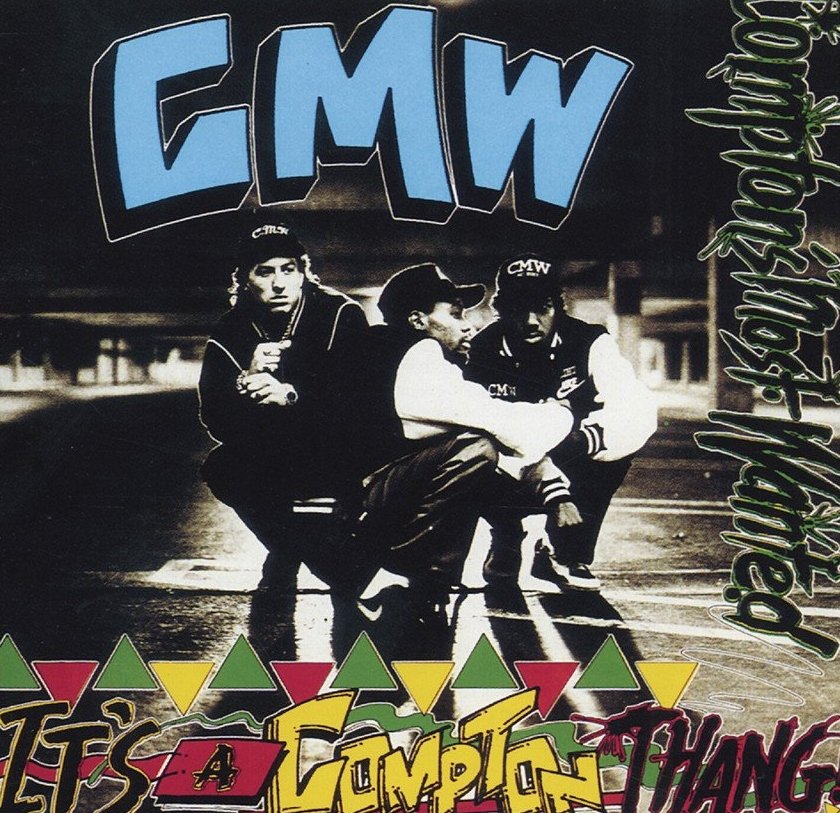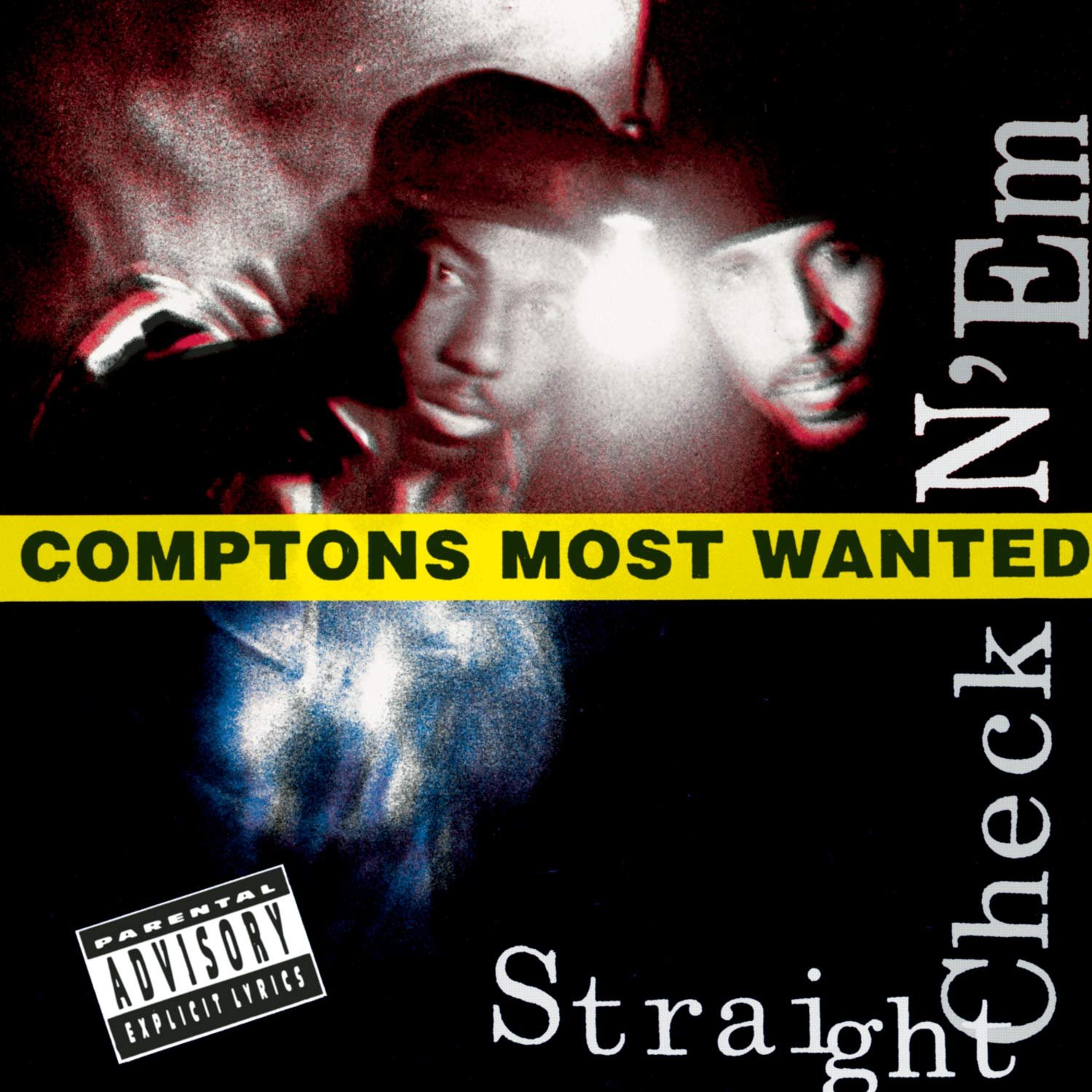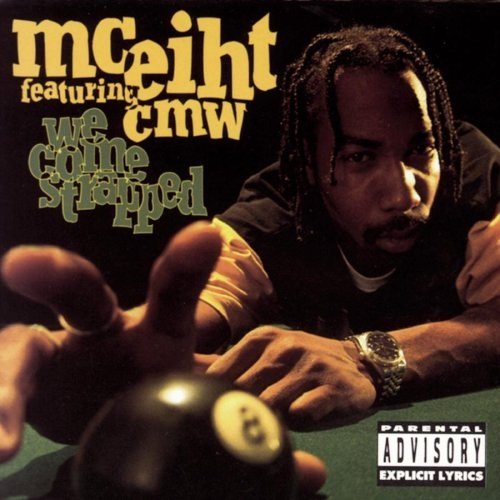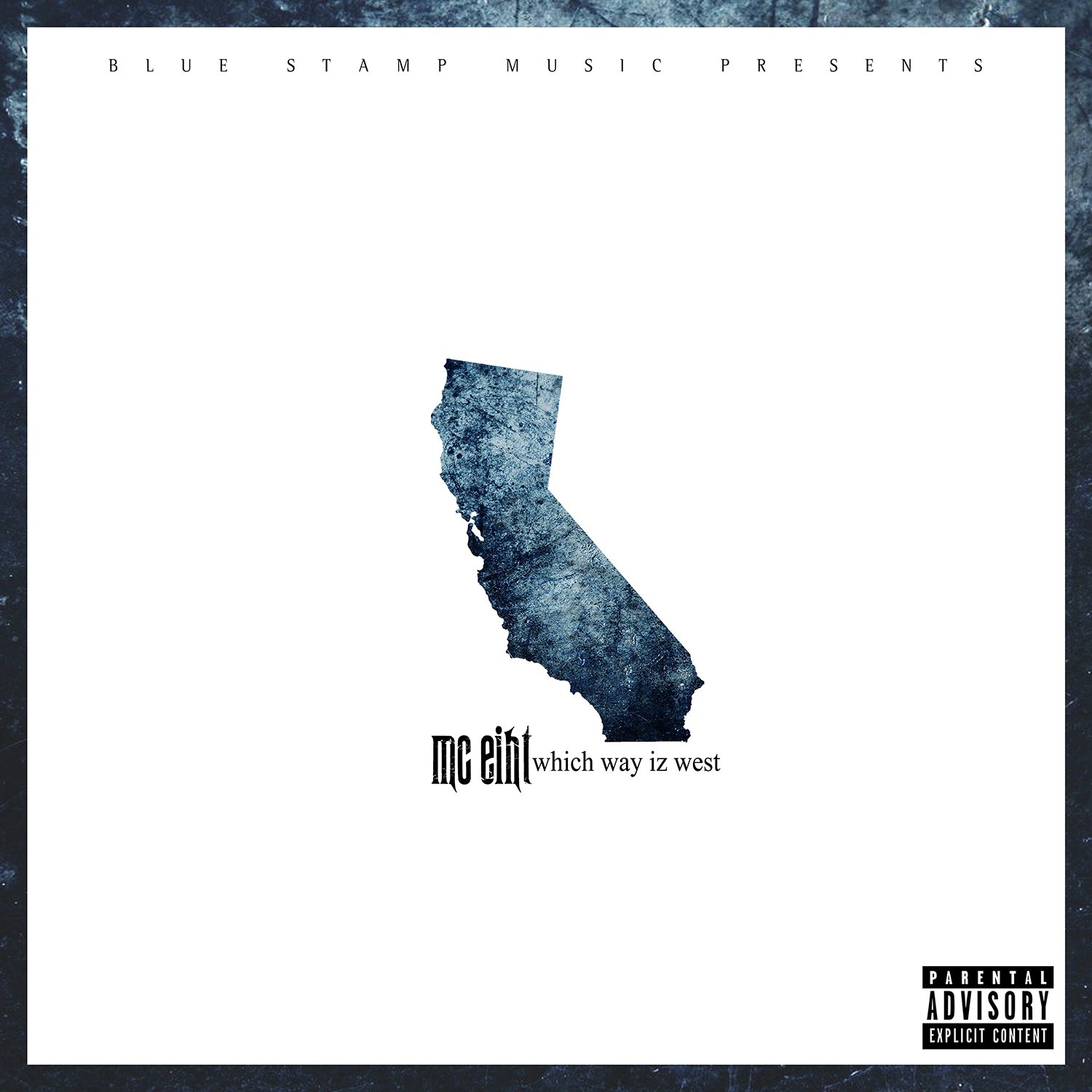Happy 30th Anniversary to Compton’s Most Wanted’s third studio album Music to Driveby, originally released September 29, 1992.
Gangsta Rap may have been created by artists like Ice-T, N.W.A, and King Tee, but Compton’s Most Wanted is its poster child. More than any other group, their albums embodied what gangsta rap was about in early ’90s hip-hop with respect to its subject matter, musical sensibilities, and execution. And with their third album, 1992’s Music to Driveby, the group played to their strengths and continued to do what they did best, creating a superior work of music in the process.
Compton’s Most Wanted (a.k.a. CMW) had a large shifting line-up of rappers, DJs, and producers. Its most widely known lineup included lead emcee/frontman Aaron “MC Eiht” Tyler, producer Terry “DJ Slip” Allen, and DJ/producer Mike “DJ Mike T” Bryant.
Eiht was known for a notoriously smooth yet sinister voice, while maintaining an understated microphone persona that was also able to let loose a fierce lyrical barrage. Production-wise, Slip and Mike T created a dark soundscape, expertly putting together sample-based tracks to complement Eiht’s flow. And in terms of scratching, Mike T’s turntable wizardry was the best there ever was on any gangsta rap album.
Music to Driveby was released during the continued mainstream ascension of gangsta rap at the tail end of hip-hop’s revered golden era, and is arguably the crew’s second strongest album. It’s the third album that the crew released in three years, which makes it striking that the group had so much creativity left in the tank after such a productive run. CMW had taken what they were already good at, and improved upon these qualities in all key areas. The album might be a notch above their 1990 debut It’s a Compton Thang and a hair below their 1991 sophomore joint Straight Checkn 'Em in terms of overall quality, but its highs are higher than the latter.
Production for the album is handled by numerous CMW-camp producers, as Eiht, Slip, and Mike T all contribute tracks, along with DJ Unknown and Ric Roc (not to be confused with Rick Rock, formerly of Cosmic Slop Shop and the notable producer for Bay Area-based acts). The producers crafted a musical palette based around early ’70s soul and funk samples, resulting in a sequence of great tracks to play in the car or on the front porch.
Lyrically, Eiht excels the most on Music to Driveby, as he examines the harrowing life in the city of Compton and settling scores. There’s occasional lyrical exhibition tracks, such as the rugged and all-too-brief “Hit the Floor” or the pulsing “8 Iz Enough,” but the real power of the album lies in Eiht’s vividly detailed descriptions of gang-affiliated life while trying to survive in Compton.
Listen to the Album:
Beyond merely explaining the day-to-day existence of an inner-city dweller, Eiht often digs deep psychologically into the effects of growing up in poverty, delving into the thought process behind the actions. The city of Compton is a character in and of itself on Music to Driveby, and one that is known to mercilessly swallow its residents whole. However, it’s also a creature that Eiht maintains a fierce loyalty to, knowing that it’s shaped his identity.
Eiht explores these themes best on “Hood Took Me Under,” the album’s first single. Right off the bat, he sets the grim scene, explaining how there are young Black men in his situation who literally have no choice but to get caught up in the cycle of violence: “I got another gang story to tell / Peep, about how a Black n***a was born in hell / And right then and there, it’s no hope / ’Cause a n***a can’t escape the gangs and the dope / Damn! And when it’s Black on Black, that makes it shitty / Can’t survive in the Compton city / And fool that’s bet / ’Cause when you grow up in the hood, you gots to claim a set / Gyeah, it’s not that you want to, but you have to / Don't be a mark, ’cause n***as might clap you.”
As the song continues, Eiht shows the narrator going from young gang member trying to survive, to dedicated and seasoned teenage banger, to an adult arrested for committing homicide and now facing 25 to life in prison. The track conveys the tragedy that through it all, the narrator never had any choice and reaching this end was always a foregone conclusion. It’s a bleak worldview, but it’s sadly one that also rings true.
Other tracks on the album navigate similarly dour territory, but remain morbidly powerful. On “This Is a Gang,” Eiht continues to describe “living in the land of the fucked-up shit,” where he describes the existence of a gang member who’s spent half of his life incarcerated, and who’s life has become an endless whirlwind of violence and death, to the point where neither mean anything to him anymore.
Tracks like “Compton 4 Life” and “I Gots ta Get Over” are similarly effective at depicting the what gang members do to make ends meet and ensure that the make it to the next day, whether it be robbing people, selling drugs, or committing homicide in order to “protect” their business. With “Jack Mode,” Eiht tells three separate tales of robbing innocent bystanders, not out of pleasure, but out of “need” for money to survive.
With “N***az Strugglin” Eiht details the hopelessness that can consume residents stuck in the grip of the inner-city who are looking to live right, but constantly feel themselves pushed towards living through illegal means. Over a slow loop from Isaac Hayes’ “The Look of Love,” Eiht assumes the role of 17-year-old who gets his girlfriend pregnant and turns to street crime as a way to support his child, rapping, “Beggin’ just ain’t friendly / Can’t get a job at motherfuckin’ Wendy’s / Gotta go out and test my skills / A brother gotta kill to bring home the bills / It ain’t the way I was born, the way I grew up / To gets what’s yours and don’t even give a fuck / So, n&^%a, gimme what’s mines and get on / Punk, you know the routine, it’s the same ass song.”
Watch the Official Videos:
Another of the album’s best tracks is “N 2 Deep,” where Eiht teams up with the legendary Scarface for a wicked duet. The Houston-born icon has been known to write a rhyme or two about the psychological effects of poverty and living through illegal means, so a pairing with Eiht was of course a no-brainer. However, here Eiht and Scarface eschew the angst and pathos to create a tale of a straightforward gangsta rap superhero team-up over a sample from Lyn Collins’ version of “Do Your Thing,” where the two unite to rule the streets of Compton and Houston, respectively.
On his verse, Scarface dares his enemies to test him, rapping, “Mista, Mista Scarface for the nine-deuce / N***as pack a nine, fuck you bitch, I pack a nine too / Millimeter Ruger for you hoes who try to flex nuts / You point your shit, I pull my shit, come n***a, now let’s check nuts.” Meanwhile, Eiht boasts, “Now them one-times is all on my back and / Heard that Eiht and Scarface peeled the cap and / They wanna gaffle us up, but it’s a shame / Can’t fade the best from Compton and the Midwest.” Eiht and Scarface sound like they enjoyed themselves recording together, and on an album that leans heavy on the despair of everyday existence, the track is a welcome break.
Eiht also spends a good chunk of Music to Driveby targeting those who dissed him, his city of birth, or both. One of his frequent targets is Tim Dog, who infamously released “Fuck Compton” in late 1991 and mentioned Eiht specifically on his Penicillin on Wax album. Eiht decided to fire back with numerous disses toward the Bronx-born emcee on Music to Driveby. He starts off with “Who’s XXXXing Who?,” a brief but devastatingly effective dis track. Eiht goes for the throat with just one verse, rapping, “Fool, you picked the wrong place, at the wrong time / So watch the driveby punk ’cause your ass is mine / I set the fire to the fuse so now it’s too late / ’Cause with your wick wack shit you can't touch the Eiht.” But the star of the track is Mike T, who eviscerates Tim Dog using the turntables. Mike T pairs vocal scratches from “Fuck Compton” with samples of vocals from Ice Cube and KRS-One to commit a scratch thrashing.
Tim Dog catches more blows on “Another Victim,” an up-tempo yet smooth track built around a sample of Isaac Hayes’ “Blue’s Crib.” Eiht dumps more lyrical shots into Tim Dog throughout the track, then gets extremely direct with “Eiht’ll some shit so save the drama / N***a, ‘Fuck Compton’? Fool, fuck your mama.”
But DJ Quik is the most frequent target of Eiht’s animosity, with Eiht lighting into the fellow Compton-born rapper/producer on no fewer than three tracks. The genesis of the beef is a bit hard to decipher, and seems born out of misunderstandings and misinterpretations of tracks on each of their albums, and is at least in part due to Eiht and Quik’s past gang affiliations. DJ Quik eventually called out Eiht directly twice on his 1992 Way 2 Fonky album, so Eiht unloaded with a lyrical bazooka in return.
Eiht first disses Quik on “Duck Sick II” a sequel to a track on CMW’s first album, where Eiht slowly lights into his lyrical enemies over a mellow loop from Billy Cobham’s “Red Baron.” It’s not clear how much of the song takes aim at Quik in particular, but clearly Eiht had him in mind when he rapped “I don’t believe it, another motherfucka / On the rap shelf done fucked himself / Just squeezed in like a bitch / I guess that’s why he raps with a high pitch.” Eiht continues his barrage toward Quik on the very next track, the guitar-driven “Dead Men Tell No Lies,” where he states, “Gyeah, one more busta, another mark / Fool you’re kind of fake, talking about you fucked the Eiht / Damn, another sorry bitch with some street slang / Peel his cap cause we ain’t from the same gang / Talking about you’ll shoot the Eiht from the top of the tree / N***a please, I might drop you to your fucking knees.”
The best of these Quik disses comes with “Def Wish II,” as Eiht engages in more lyrical homicide over a dark and sinister loop from Quincy Jones’ “Snow Creatures.” In between samples from the film Goodfellas, Eiht spits even more lyrical venom at Quik, making it clear he really doesn’t like the guy: “Peep – I’m putting suckers to sleep / Ready to make a motherfucking hit, gyeah, we rolling too deep / You shouldn’t have made that tape, but you pushed me / Eiht hates punk-ass, perm-wearing pussies.”
Enjoying this article? Click/tap on the album covers to explore more about Compton’s Most Wanted & MC Eiht:
Though CMW remained a unit after the success of Music to Driveby, more and more emphasis was placed on Eiht. It made sense, since Eiht remained the visible frontman and the person that most listeners associated with the group. “Streight Up Menace,” the theme song to the 1993 film Menace II Society (which Eiht also appeared in) was released and marketed as an MC Eiht solo track (even though it was produced by DJ Slip) and was a modest hit.
As a result, the group’s next two releases, We Come Strapped and Death Threatz, were packaged as albums by “MC Eiht featuring CMW.” By 1997, Eiht went full-fledged solo, and has since released over a dozen albums and mixtapes. CMW has periodically reunited over the last 25 or so years, releasing an album or two and making appearances on Eiht’s solo material. Some of these albums are quite good (especially We Come Strapped and Death Threatz), but to be honest, none equal the quality of Music to Driveby.
Music to Driveby remains an elucidating listen. It’s an album that has a lot on its mind, even if the listener just gets caught up in the flows and beats. Few emcees are better than MC Eiht at conveying the misery of inner-city living while still creating provocative music that’s enjoyable to listen to. Much of the album is “reality” rap in the truest sense: not glamorizing the pain and violence that permeated the streets of Compton during the early ’90s, but effectively showing its causes and consequences.
LISTEN:
Editor's note: this anniversary tribute was originally published in 2017 and has since been edited for accuracy and timeliness.





